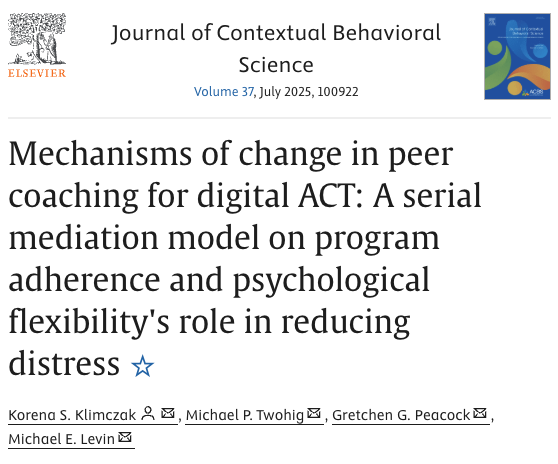Journal of Contextual Behavioral Science (JCBS)
Volume 37, July 2025
Authors
Korena S. Klimczak, Michael P. Twohig, Gretchen G. Peacock, & Michael E. Levin
Key Findings
- Phone and text coaching's effects on mental health are mediated by program adherence.
- Phone coaching can boost psychological flexibility independently of program adherence.
- Text coaching has a small direct effect on psychological distress.
Abstract
Background
Coaching is a well-supported intervention for improving adherence to online mental health programs. It is currently unclear whether peer-support coaching improves mental health outcomes solely through improving program adherence, or if it can also have a direct impact on mental health. We investigated this using a randomized controlled trial and applying serial mediation models.
Method
A total of 230 college students were instructed to use the 12-session ACT Guide program over 10 weeks. They were randomly assigned to additionally receive either peer-support coaching over weekly phone calls, text message conversations, or a no-coaching control group. Coaching followed a standardized protocol.
Results
Phone coaching had a significant total effect, but not a direct effect, on psychological distress. Both the phone coaching → psychological flexibility → distress, and the phone coaching → program adherence → psychological flexibility → distress indirect pathways were significant. Text coaching had a significant total and direct effect on psychological distress. The full serial pathway was the only significant indirect effect (text coaching → program adherence → psychological flexibility → distress).
Conclusions
We found that peer coaching in both formats significantly increased program adherence, which in turn improved psychological flexibility, consequently reducing psychological distress. Coaching through phone calls had a significantly greater indirect effect on distress and direct effect on program adherence in comparison to the text message format. It is possible that the skills review and ACT-based strategies used in phone coaching directly improve psychological flexibility regardless of the number of modules completed, with text coaching being too brief to elicit this same effect.
